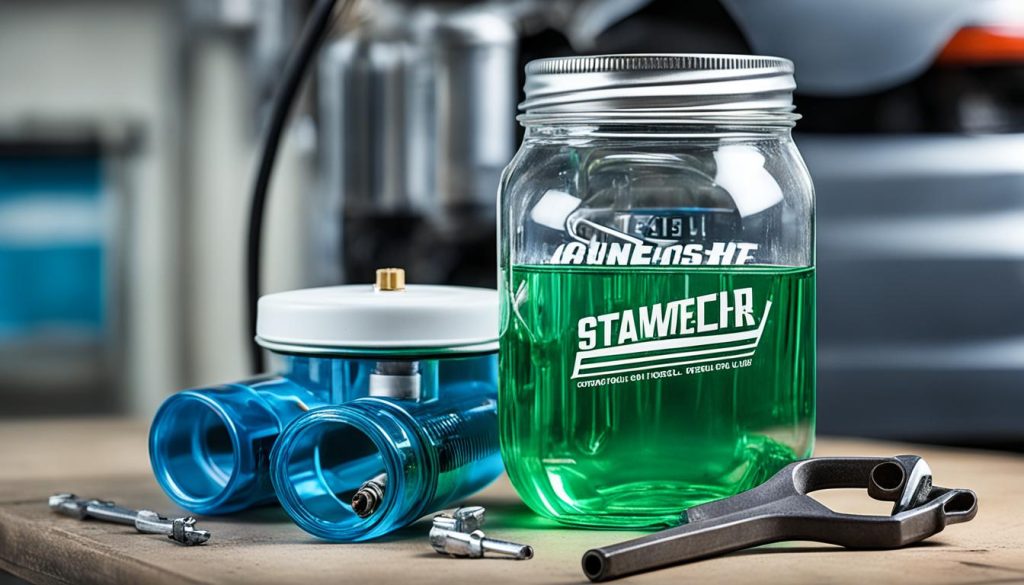Introduction
A fuel filter is an essential component in a car’s fuel system that traps unwanted debris and contaminants as the fuel passes through it. Over time, the fuel filter can become clogged, restricting the flow of fuel to the engine and causing various issues with starting the car. If you experience difficulty starting your car, sputtering during idle, inconsistent acceleration, irregularly high engine temperature, or a drop in fuel efficiency, these could all be signs of a clogged fuel filter. It is recommended to replace or clean the fuel filter every 30,000 miles or as specified in your owner’s manual. Ignoring a clogged fuel filter can lead to engine damage or malfunction.
Key Takeaways:
- Recognize the symptoms of a clogged fuel filter, such as difficulty starting the car, sputtering, inconsistent acceleration, high engine temperature, or decreased fuel efficiency.
- Regularly check and maintain the fuel filter every 30,000 miles or as specified in your owner’s manual.
- Ignoring a clogged fuel filter can result in engine damage or malfunction.
- Consult a professional or refer to your owner’s manual for instructions on replacing or cleaning the fuel filter.
- Practice regular maintenance and keep other vehicle filters, such as the engine air filter, transmission filter, and cabin air filter, in good condition for optimal performance.
The Effects of a Bad Fuel Filter on Starting a Car
A bad fuel filter can have a significant impact on the starting of your car. When the fuel filter becomes clogged, it restricts the flow of fuel to the engine, making it difficult or even impossible for the car to start. This issue arises because the clogged filter prevents the engine from receiving the necessary fuel to ignite and run smoothly.
If you attempt to start your car with a partially clogged fuel filter, you may experience ignition problems. The engine may struggle to fire up, leading to sputtering and inconsistent idle. On the other hand, a completely clogged fuel filter can prevent the engine from starting altogether, causing frustration and inconvenience.
Diagnosing the Issue
To address the starting issues caused by a bad fuel filter, proper diagnosis is crucial. If you suspect a clogged fuel filter is the culprit, you can conduct a fuel pressure test. This test will help determine if the filter is causing a decrease in fuel flow to the engine.
After confirming the clogged condition of the fuel filter, it is essential to take prompt action. Ignoring the issue can lead to further damage to the engine and potentially more expensive repairs down the line.
Replacing the fuel filter is typically the most effective solution. By installing a new filter, you ensure proper fuel flow and optimize engine performance. It is recommended to consult your vehicle’s owner manual or seek professional assistance to ensure the correct filter is installed.
| Effects of a Bad Fuel Filter on Starting a Car: | Solutions: |
|---|---|
| A partially clogged filter causes ignition problems |
|
| A completely clogged filter prevents the engine from starting |
|
In conclusion, a bad fuel filter can significantly impact the starting of your car. Whether it leads to ignition problems or prevents the engine from starting altogether, it is crucial to address the issue promptly. By diagnosing the problem correctly and replacing the clogged fuel filter, you can restore the proper fuel flow and ensure the smooth operation of your car’s engine.
How to Start a Car with a Bad Fuel Filter
If you find yourself in a situation where you need to start a car with a faulty fuel filter, there are several steps you can take to potentially get the engine running. However, it’s important to note that these are temporary solutions, and you should have the filter replaced as soon as possible to avoid further damage to the engine.
Step 1: Locate and inspect the fuel filter
The fuel filter is typically situated between the fuel tank and the fuel injectors under the hood of your car. Using the owner’s manual or a repair guide for reference, find the exact location of the fuel filter in your vehicle. Once located, visually inspect the filter for any signs of damage or clogging.
Step 2: Check the fuel pressure
Using a fuel pressure gauge, check the fuel pressure in the system. If the pressure is abnormally low, it’s a good indication that the fuel filter is clogged and causing fuel flow restrictions. Low fuel pressure can make it difficult for the engine to start or even prevent it from starting altogether.
Step 3: Clean or replace the fuel filter
If you’ve confirmed that the fuel filter is the culprit behind the starting issues, you can try cleaning it to temporarily improve fuel flow. However, keep in mind that cleaning the filter might not completely solve the problem, as the clogging could be severe. In that case, it’s recommended to replace the fuel filter altogether.
Note: Driving with a bad fuel filter is not advisable, as it can lead to further damage to the engine. Therefore, even if you manage to start the car using these methods, it’s important to prioritize replacing the filter as soon as possible.
By following these steps, you may be able to start your car with a bad fuel filter temporarily. However, it’s imperative to remember that this is only a temporary solution, and having the filter replaced is essential for the long-term health and performance of your vehicle.
Preventing Fuel Filter Issues
To prevent fuel filter issues, it is important to practice regular maintenance and take appropriate measures. By following these steps, you can maintain a healthy fuel filter and ensure the proper functioning of your vehicle’s fuel system.
Use High-Quality Fuel
Using high-quality fuel is crucial in preventing fuel filter issues. Low-quality or contaminated fuel can introduce debris and contaminants into the fuel system, leading to clogs in the filter. Choose reputable gas stations and fuel providers to minimize the risk of fuel contamination.
Maintain Fuel Storage and Delivery Systems
Keeping the fuel storage tanks and delivery systems in good condition is essential for preventing fuel filter problems. Regularly inspect the fuel tank for any signs of corrosion or damage. Ensure that the fuel lines and hoses are securely connected and free from leaks. By maintaining the integrity of the fuel storage and delivery systems, you can minimize the chances of contaminants entering the fuel and causing filter clogs.
Perform Regular Servicing and Maintenance
Regular servicing and maintenance of the fuel system are key to preventing fuel filter issues. Consult your vehicle owner’s manual for the recommended interval for fuel filter replacement or cleaning. It is generally recommended to replace or clean the fuel filter every 30,000 miles or as specified by the manufacturer. By staying proactive with maintenance, you can prevent clogs and ensure the proper filtration of fuel.
Inspect and Replace Worn Components
During routine servicing, it is important to inspect other components of the fuel system that can affect the performance of the fuel filter. Check for any signs of wear or damage in fuel lines, connectors, and seals. Replace any worn or damaged components to maintain the integrity of the fuel system and prevent fuel filter issues.
To summarize, preventing fuel filter issues requires regular maintenance and awareness of potential contaminants. Using high-quality fuel, maintaining the fuel storage and delivery systems, performing regular servicing, and replacing worn components are all essential steps in maintaining a healthy fuel filter. By following these preventive measures, you can ensure the smooth operation of your vehicle’s fuel system and avoid costly repairs in the future.

The Importance of Other Vehicle Filters
While the fuel filter is crucial for a car’s fuel system, it’s essential to recognize that other filters also play vital roles in ensuring optimal vehicle performance. The engine air filter, transmission filter, and cabin air filter all contribute to maintaining a healthy and efficient vehicle.
The Engine Air Filter
The engine air filter is responsible for preventing airborne contaminants, such as dust, dirt, and debris, from entering the engine. By filtering the air before it reaches the engine, the engine air filter helps protect the engine’s internal components from damage, optimizing its performance and longevity.
The Transmission Filter
The transmission filter is an essential component of the vehicle’s transmission system. Its primary function is to prevent dirt, debris, and metal particles from entering the hydraulic system. By filtering the transmission fluid, the transmission filter helps maintain proper lubrication and prevents damage to the transmission, ensuring smooth gear shifts and overall transmission performance.
The Cabin Air Filter
The cabin air filter is responsible for the quality of the air you breathe inside the vehicle. It filters out dust, pollen, mold spores, and other airborne particles, ensuring clean and fresh air in the cabin. Regularly replacing the cabin air filter not only promotes a healthier driving environment but also helps maintain the efficiency of the vehicle’s heating, ventilation, and air conditioning (HVAC) system.
Conclusion
Starting a car with a bad fuel filter can be a frustrating experience that leads to various issues. Recognizing the symptoms of a clogged fuel filter, such as difficulty starting the car, sputtering during idle, and a drop in fuel efficiency, is crucial to taking appropriate action. Cleaning or replacing the fuel filter is essential to ensure the proper functioning of the engine and prevent further damage or malfunction.
Regular maintenance of the fuel system, including the fuel filter, is key to preventing starting problems and avoiding costly repairs. It is recommended to follow the manufacturer’s guidelines and replace or clean the fuel filter every 30,000 miles or as specified in the owner’s manual. Ignoring a clogged fuel filter can result in engine damage and reduced performance.
In addition to the fuel filter, it is important to maintain other vehicle filters, such as the engine air filter, transmission filter, and cabin air filter. These filters play a vital role in optimizing vehicle performance, protecting the engine from contaminants, and ensuring clean air inside the vehicle. Regularly inspecting and replacing these filters as needed will keep your car running smoothly and efficiently.
FAQ
What are the signs of a bad fuel filter?
The signs of a bad fuel filter include difficulty starting the car, sputtering during idle, inconsistent acceleration, irregularly high engine temperature, and a drop in fuel efficiency.
Can a bad fuel filter prevent a car from starting?
Yes, a bad or clogged fuel filter can restrict the flow of fuel to the engine, making it difficult or even impossible for the car to start.
How should I start a car with a bad fuel filter?
To start a car with a bad fuel filter, you can try cleaning or replacing the filter. However, it is important to note that driving with a bad fuel filter can cause further damage to the engine.
How can I prevent fuel filter issues?
You can prevent fuel filter issues by using high-quality fuel, keeping the fuel storage tanks and delivery systems in good condition, and practicing regular maintenance of the fuel system.
Are there other vehicle filters that are important to maintain?
Yes, besides the fuel filter, it is also important to maintain the engine air filter, transmission filter, and cabin air filter to ensure optimal vehicle performance and protect the engine and occupants.
What can I do to keep my car running smoothly with a bad fuel filter?
It is recommended to promptly address the issue by cleaning or replacing the fuel filter and practicing regular maintenance to prevent further damage to the engine.







